
What does an engineer do?
2 MIN. READ
An engineer applies scientific and mathematical principles to design, develop, test, and maintain various systems, structures, and technologies. The specific tasks and responsibilities of an engineer can vary greatly depending on their field of specialization. Here’s an overview of what engineers do across different disciplines:
Core Responsibilities
- Design and Development
– Conceptualizing Solutions: Engineers often start by identifying problems and conceptualizing solutions. This involves brainstorming ideas, creating sketches, and developing initial models.
– Detailed Design: Using computer-aided design (CAD) software, engineers create detailed plans and blueprints for structures, machines, systems, or products.
– Prototyping: Building prototypes to test ideas and refine designs. This stage often includes 3D modeling and simulation.
- Analysis and Testing
– Simulation and Modeling: Engineers use simulations and mathematical models to predict how systems will behave under different conditions.
– Testing: Conducting tests on materials, components, and systems to ensure they meet required specifications and standards. This includes stress tests, safety checks, and performance evaluations.
– Problem-Solving: Analyzing test results to identify issues and making necessary adjustments to designs or processes.
- Implementation and Maintenance
– Project Management: Planning and overseeing the implementation of projects, ensuring they are completed on time and within budget. This includes coordinating with other team members and stakeholders.
– Installation and Commissioning: Supervising the installation of equipment, systems, or structures, and ensuring they are properly set up and functioning.
– Maintenance and Upgrades: Regularly inspecting and maintaining systems to ensure they operate efficiently. Engineers also develop plans for upgrades and improvements.
- Research and Innovation
– Research: Conducting research to advance knowledge in their field, which can lead to new technologies, materials, or processes.
– Innovation: Developing new products or improving existing ones to meet changing needs and advance industry standards.
Specialized Roles
- Civil Engineer
– Infrastructure Projects: Designing, constructing, and maintaining infrastructure such as roads, bridges, buildings, and water supply systems.
– Urban Planning: Working on urban development projects, ensuring sustainable and efficient use of space and resources.
- Mechanical Engineer
– Mechanical Systems: Designing and manufacturing mechanical devices, such as engines, HVAC systems, and tools.
– Automation and Robotics: Developing automated systems and robotic devices for manufacturing and other applications.
- Electrical Engineer
– Electrical Systems: Designing and maintaining electrical systems, including power generation, transmission, and distribution.
– Electronics: Working on electronic devices and systems, from consumer electronics to industrial control systems.
- Chemical Engineer
– Process Engineering: Designing processes for manufacturing chemicals, pharmaceuticals, and food products.
– Environmental Solutions: Developing methods to minimize waste and pollution, and to clean up environmental contaminants.
- Software Engineer
– Software Development: Writing and testing code for software applications, systems, and platforms.
– Systems Architecture: Designing the overall structure of software systems to ensure they meet user requirements and perform efficiently.
- Biomedical Engineer
– Medical Devices: Designing and developing medical devices and equipment, such as prosthetics, imaging devices, and diagnostic tools.
– Healthcare Solutions: Innovating new technologies to improve patient care and medical outcomes.
Interdisciplinary and Emerging Fields
- Environmental Engineer
– Sustainability Projects: Developing technologies and systems to protect the environment and promote sustainability, such as waste treatment and renewable energy systems.
- Data Engineer
– Big Data: Designing and maintaining systems for collecting, storing, and analyzing large volumes of data to support decision-making processes.
- Aerospace Engineer
– Aircraft and Spacecraft Design: Developing technologies for aviation and space exploration, including the design of airplanes, satellites, and spacecraft.
Daily Activities
- Team Collaboration
– Interdisciplinary Work: Collaborating with professionals from other fields, such as architects, scientists, and business analysts, to ensure project success.
– Communication: Regularly meeting with clients, stakeholders, and team members to discuss project progress and challenges.
- Documentation and Reporting
– Technical Documentation: Writing detailed technical reports, user manuals, and documentation for designs and processes.
– Compliance: Ensuring all work meets regulatory standards and industry guidelines.
In conclusion, Engineers play a crucial role in shaping the world we live in by applying their expertise to solve complex problems, improve existing systems, and innovate new technologies. Their work is essential across a wide range of industries, from construction and manufacturing to healthcare and information technology.
Through Anderson’s Engineering Program, you will discover what you can do in Engineering. Ready to get started? Contact our admissions team to schedule a visit!
Anderson University educates students for lives of faith and service, offering more than 50 undergraduate majors, 30 three-year degrees, 18 NCAA Division III intercollegiate sports, alongside adult, graduate, and online programs. The private, liberal arts institution is fully accredited and recognized for excellence in business, computer science, cybersecurity, engineering, music, nursing, psychology, and teacher education programs. Established in 1917 in Anderson, Indiana, by the Church of God, the university remains committed to its Christ-centered mission.